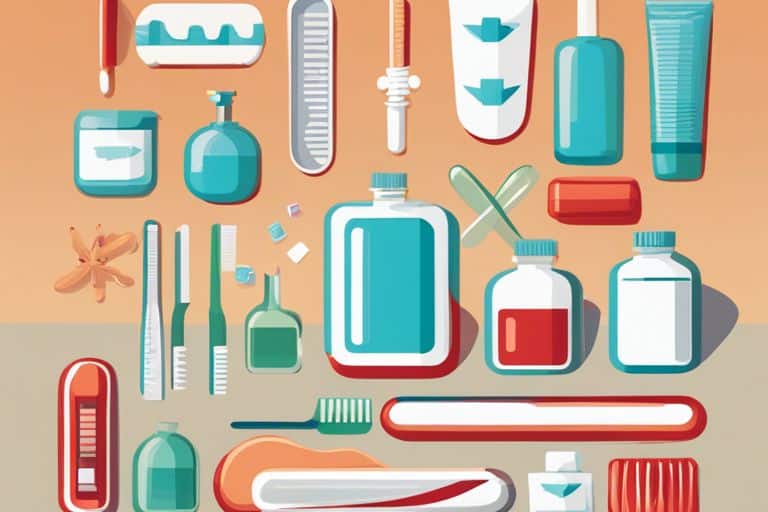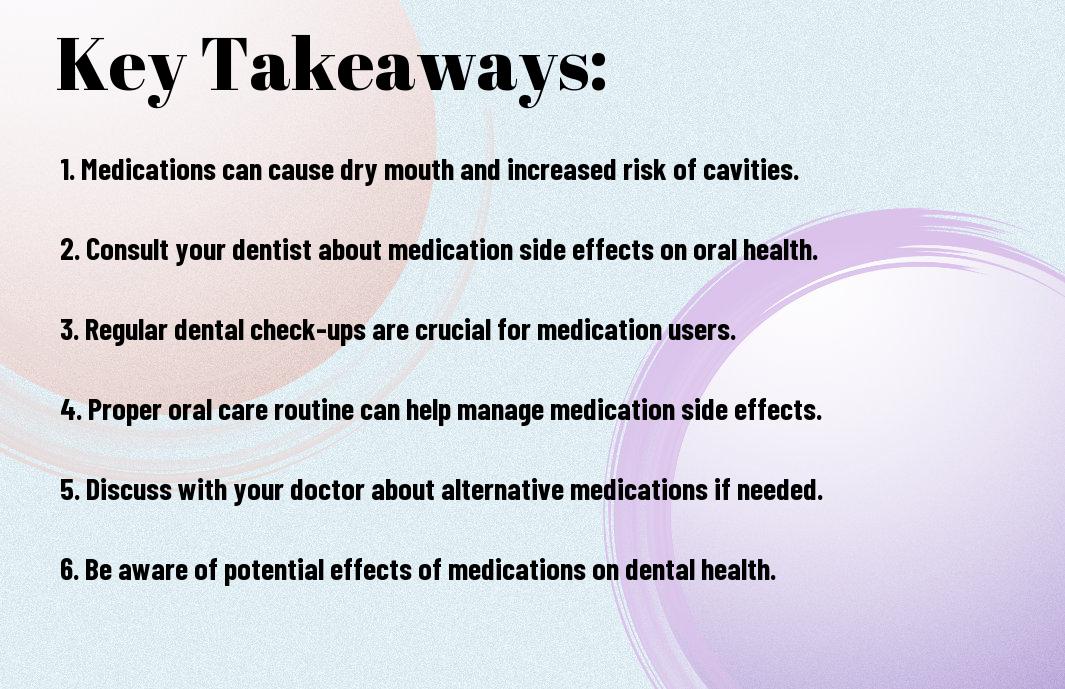Medications play a crucial role in managing various health conditions, but they can also have unexpected impacts on dental health. Side effects such as dry mouth, changes in taste, and gum overgrowth are common issues that can arise from taking certain medications. Understanding the connection between medications and dental health is important for effectively managing these side effects and maintaining optimal oral health. In this blog post, we will explore into how different medications can affect dental health and provide tips on how to mitigate these side effects for a healthier smile.
How Medications Affect Dental Health
Impact on Saliva Production
Affecting saliva production is a common side effect of many medications. Saliva plays a crucial role in maintaining oral health by washing away food particles, neutralizing acids, and preventing bacterial overgrowth. When medications reduce saliva production, it can lead to dry mouth, also known as xerostomia.
Xerostomia can increase the risk of tooth decay, gum disease, and oral infections. It can also cause difficulty in speaking, swallowing, and wearing dentures comfortably. If you are experiencing dry mouth as a side effect of your medication, it is important to stay hydrated, chew sugar-free gum, and discuss possible solutions with your dentist.
The Role of Medications in Gum Disease
On top of affecting saliva production, certain medications can contribute to the development of gum disease. Medications like antihistamines, decongestants, and antidepressants can cause a decrease in saliva flow, leading to a dry mouth and creating an environment optimal for bacteria to thrive.
Furthermore, some medications can also cause overgrowth of gum tissue, making it difficult to keep the gums clean and increasing the likelihood of inflammation and infection. It is vital to inform your dentist about all the medications you are taking to ensure they can provide appropriate care and advice to prevent gum disease.
To further emphasize the importance of managing the impact of medications on gum disease, it is crucial to attend regular dental check-ups and cleanings. Your dentist can monitor any changes in your oral health and provide tailored recommendations to address the side effects of medications on your gums. Working collaboratively with your healthcare providers can help mitigate the effects of medications on your dental health and maintain a healthy smile.
Common Oral Side Effects of Medications
Dry Mouth and Its Consequences
Oral dryness, also known as xerostomia, is a common side effect of many medications. It occurs when the salivary glands do not produce enough saliva to keep the mouth moist. Dry mouth can lead to difficulties in speaking, chewing, swallowing, and may result in bad breath. Additionally, a lack of saliva increases the risk of cavities, gum disease, and oral infections.
It is important to address dry mouth promptly to prevent further oral health issues. Drinking water regularly, chewing sugar-free gum, using saliva substitutes, and avoiding caffeine and alcohol can help alleviate dry mouth symptoms and improve overall oral health.
Medications that Discolor Teeth
Any medication that contains iron, antihistamines, antipsychotics, or certain antibiotics can potentially cause teeth discoloration. These medications can stain the outer layer of the teeth, known as enamel, giving them a yellow, gray, or brown hue. Maintaining good oral hygiene habits, such as regular brushing and dental cleanings, can help prevent or minimize the discoloration caused by these medications.
Medications that discolor teeth can have aesthetic implications and impact an individual’s confidence in their smile. It is advisable to consult with a dentist if you notice any changes in the color of your teeth while taking medication. Your dentist can provide recommendations on how to prevent further discoloration and suggest suitable treatment options to restore the natural brightness of your teeth.
Strategies for Managing Dental Side Effects of Medications
You may be taking medications for various health conditions, but did you know that certain medications can have an impact on your oral health? According to How medications can affect your oral health – JADA, some drugs can lead to dental side effects such as dry mouth, gum overgrowth, or an increased risk of cavities. Fortunately, there are strategies you can implement to manage these side effects effectively.
Improving Oral Hygiene Habits
Dental hygiene is crucial, especially when taking medications that can affect your oral health. It is imperative to brush your teeth at least twice a day with fluoride toothpaste and floss daily. Additionally, using an antimicrobial mouthwash can help reduce bacteria in your mouth and prevent oral health issues.
Regular dental check-ups and cleanings are also vital for maintaining good oral health, particularly when you are on medications that may cause dental side effects. Your dentist can identify any issues early on and provide personalized recommendations to mitigate the impact of these medications on your oral health.
Consultation with Dental and Medical Professionals
Any concerns about the impact of medications on your dental health should be addressed with both your dental and medical professionals. It is crucial to inform them about all the medications you are taking, including over-the-counter drugs and supplements, to develop a comprehensive treatment plan that considers your oral health needs.
Professionals can work together to adjust your medications if necessary or recommend additional strategies to manage dental side effects effectively. By maintaining open communication with your healthcare providers, you can ensure that your oral health is prioritized while managing your overall health.
Preventative Measures and Oral Health Maintenance
Regular Dental Checkups and Cleanings
All individuals, especially those taking medications that may affect oral health, should prioritize regular dental checkups and cleanings. These routine visits play a crucial role in maintaining good oral hygiene and catching any potential issues early on. Dentists can not only clean and polish your teeth but also assess the health of your gums, identify cavities or other problems, and provide valuable guidance on oral care.
During these appointments, your dentist may also recommend additional preventive measures based on your specific medication regimen to mitigate any potential side effects. By staying proactive with your dental care, you can prevent more significant issues from arising down the line and ensure your overall oral health remains optimal.
Diet, Nutrition, and Medication Timing
Oral health is intimately connected to an individual’s diet, nutrition, and medication timing. Certain medications can have side effects such as dry mouth, which can increase the risk of cavities and gum disease. It is important to discuss any potential impacts your medications may have on your oral health with your dentist.
Health professionals recommend maintaining a balanced diet rich in important nutrients and staying hydrated to support overall oral health. Additionally, coordinating medication timing with meals and oral care routines can help minimize potential side effects and optimize the effectiveness of both your medications and oral hygiene practices.
Health
Properly managing your diet, nutrition, and medication timing can significantly impact your oral health. By making informed choices and following professional advice, you can maintain a healthy mouth and manage any potential side effects of medications more effectively.
To wrap up
So, it is clear that medications can have a significant impact on dental health, leading to a range of side effects that can affect the teeth and gums. Understanding these potential effects and working closely with both your healthcare provider and dentist is crucial in managing and minimizing any negative outcomes. By staying informed and taking proactive steps to protect your dental health, you can maintain a healthy smile even while managing medication side effects.







